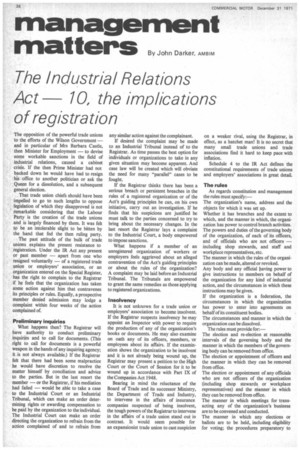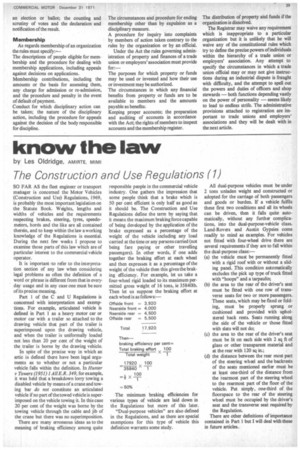• management
Page 40

Page 41

If you've noticed an error in this article please click here to report it so we can fix it.
matters By John Da rker AM B M
The Industrial Relations Act 10, the implications of registration
The opposition of the powerful trade unions to the efforts of the Wilson Government — and in particular of Mrs Barbara Castle, then Minister for Employment — to devise some workable sanctions in the field of industrial relations, caused a cabinet crisis. If the then Prime Minister had not backed down he would have had to resign his office to another politician or ask the Queen for a dissolution, and a subsequent general election.
That trade union chiefs should have been impelled to go to such lengths to oppose legislation of which they disapproved is not remarkable considering that the Labour Party is the creation of the trade unions and is largely financed by them. It was felt to be an intolerable slight to be bitten by the hand that fed the then ruling party.
The past attitude of the bulk of trade unions explains the present resistance to registration. Under the IR Act any present or past member — apart from one who resigned voluntarily — of a registered trade union or employers' association, or an organization entered on the Special Register, has the right to complain to the Registrar if he feels that the organization has taken some action against him that contravenes its principles or rules. Equally, a prospective member denied admission may lodge a complaint within four weeks of the action complained of.
Preliminary inquiries What happens then? The Registrar will have authority to conduct preliminary inquiries and to call for documents. (This right to call for documents is a powerful weapon in the hands of any inquiring agency; it is not always available.) If the Registrar felt that there had been some malpractice he would have discretion to resolve the matter himself by conciliation and advice to the parties. But in the last resort the member — or the Registrar, if his mediation had failed — would be able to take a case to the Industrial Court or an Industrial Tribunal, which can make an order determining rights or awarding compensation to be paid by the organization to the individual. The Industrial Court can make an order directing the organization to refrain from the action complained of and to refrain from any similar action against the complainant.
If desired the complaint may be made to an Industrial Tribunal instead of to the Registrar. As time passes the best option for individuals or organizations to take in any given situation may become apparent. And case law will be created which will obviate the need for many "parallel" cases to be fought.
If the Registrar thinks there has been a serious breach or persistent breaches in the rules of a registered organization or of the Act's guiding principles he can, on his own initiative, carry out an investigation. If he finds that his suspicions are justified he must talk to the parties concerned to try to bring about the necessary changes. In the last resort the Registrar lays a complaint to the Industrial Court, a body empowered to impose sanctions.
What happens if a member of an unregistered organization of workers or employers feels aggrieved about an alleged contravention of the Act's guiding principles or about the rules of the organization? A complaint may be laid before an Industrial Tribunal. The Tribunals are empowered to grant the same remedies as those applying to registered organizations.
Insolvency It is not unknown for a trade union or employers' association to become insolvent. If the Registrar suspects insolvency he may appoint an Inspector with power to require the production of any of the organization's books or documents. He may also examine on oath any of its officers, members, or employees about its affairs. If the examination shows the organization to be insolvent and it is not already being wound up, the Registrar may present a petition to the High Court or the Court of Session for it to be wound up in accordance with Part IX of the Companies Act 1948.
Bearing in mind the reluctance of the Board of Trade and its successor Ministry, the Department of Trade and Industry, to intervene in the affairs of insurance companies suspected of being insolvent, the tough powers of the Registrar to intervene in the affairs of a trade union stand out in contrast. It would seem possible for an expansionist trade union to cast suspicion on a weaker rival, using the Registrar, in effect, as a hatchet man! It is no secret that many small trade unions and trade associations find it hard to keep pace with inflation.
Schedule 4 to the IR Act defmes the constitutional requirements of trade unions and employers' associations in great detail.
The rules
As regards constitution and management the rules must specify:—
The organization's name, address and the objects for which it was set up.
Whether it has branches and the extent to which, and the manner in which, the organization has power to control branch activities. The powers and duties of the governing body of the organization, of each of its officers, and of officials who are not officers — including shop stewards, and staff and workplace representatives, etc.
The manner in which the rules of the organization can be made, altered or revoked.
Any body and any official baying power to give instructions to members on behalf of the organization for any kind of industrial action, and the circumstances in which these instructions may be given.
If the organization is a federation, the circumstances in which the organization has power to enter into agreements on behalf of its constituent bodies.
The circumstances and manner in which the organization can be dissolved.
The rules must provide for:—
The election and re-election at reasonable intervals of the governing body and the manner in which the members of the governing body can be removed from office.
The election or appointment of officers and the manner in which they can be removed from office.
The election or appointment of any officials who are not officers of the organization (including shop stewards or workplace representatives) and the manner in which they can be removed from office.
The manner in which meetings for transacting any of the organization's business are to be convened and conducted.
The manner in which any elections or ballots are to be held, including eligibility for voting; the procedures preparatory to an election or ballot; the counting and scrutiny of votes and the declaration and notification of the result.
Membership As regards membership of an organization the rules must specify:— The descriptions of people eligible for membership and the procedure for dealing with membership applications, including appeals against decisions on applications.
Membership contributions, including the amounts or the basis for assessing them, any charge for admission or re-admission, and the procedure and penalty in the event of default of payment.
Conduct for which disciplinary action can be taken; the nature of the disciplinary action, including the procedure for appeals against the decision of the body responsible for discipline. The circumstances and procedure for ending membership other than by expulsion as a disciplinary measure.
A procedure for inquiry into complaints by members of action taken contrary to the rules by the organization or by an official.
Under the Act the rules governing administration of property and finances of a trade union or employers' association must provide for:—
The purposes for which property or funds may be used or invested and how their use or investment may be authorized.
The circumstances in which any financial benefits from property or funds are to be available to members and the amounts payable as benefits.
Keeping proper accounts; the preparation and auditing of accounts in accordance with the Act; the rights of members to inspect accounts and the membership register. The distribution of property and funds if the organization is dissolved.
The Registrar may waive any requirement which is inappropriate to a particular organization but it is unlikely that he will waive any of the constitutional rules which try to define the precise powers of individuals within the hierarchy of a trade union or employers' association. Any attempt to specify the circumstances in which a trade union official may or may not give instructions during an industrial dispute is fraught with difficulty, and the attempt to spell out the powers and duties of officers and shop stewards — both functions depending vastly on the power of personality — seems likely to lead to endless strife. The administrative provisions attached to registration are important to trade unions and employers' associations and they will be dealt with in the next article.












































































